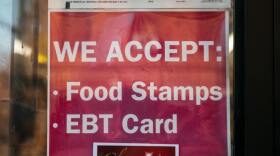-
Every five years, Congress has to renew the farm bill — a gigantic piece of legislation that supports and protects food production, natural resources and provides food benefits to low-income families.
-
Despite a federal lawsuit, callers to the state hotline handling Supplemental Nutrition Assistance Program waited on hold an average of an hour and a half in August before being connected to agents.
-
The Farm Bill, which sets important policy on matters such as crop insurance and SNAP benefits, is up for renewal next year. The results of the midterm elections may not shed much light on how that legislation will end up.
-
During the pandemic, participation in the federal program for low-income women and children dropped more steeply in Missouri than in all but one other state, a new report found. One cause might be Missouri's burdensome administrative system, which requires EBT cards to be physically swiped when loading benefits.
-
The Supplemental Nutrition Education Program (SNAP-Ed) is funded by the U.S. Department of Agriculture and helps SNAP recipients learn how to eat healthy food on a budget. Its employees complain of wages so low that they themselves qualify for SNAP.
-
Difficulty scheduling interviews contributes to a high rejection rate of SNAP applicants, the lawsuit alleges. In September, October, and December of 2021, over half of SNAP applications rejected were due to failure to complete an interview, according to the lawsuit.
-
One of the transgender bills was added to a bill containing multiple measures about Missouri elections, including the requirement that voters show a photo ID in order to cast their ballot.
-
A new report from the USDA shows benefits from the Supplemental Nutrition Assistance Program, formerly known as food stamps, have a bigger impact on rural economies.
-
A federal program called P-EBT could help cover hundreds of dollars in groceries for families with children who lost access to meals because they attended class online and not in person during the 2020-21 school year.
-
To address the ‘historic’ high call volume, the federal government has given Missouri permission to suspend recertification interviews to receive food stamps.
Play Live Radio
Next Up:
0:00
0:00
Available On Air Stations










